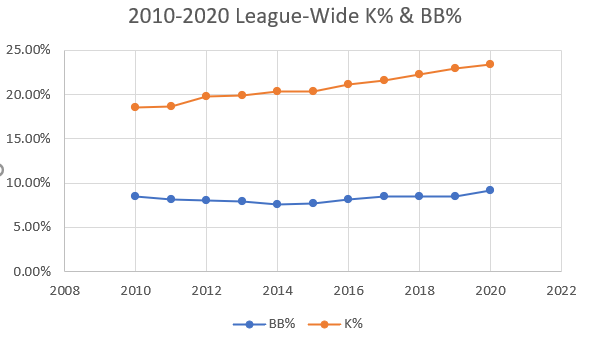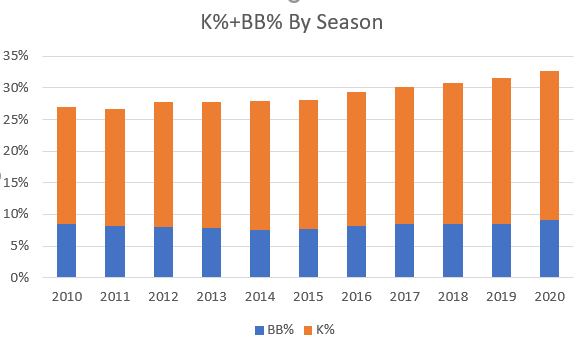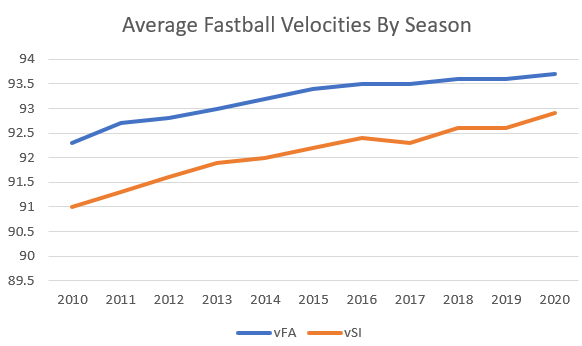This article is part of our Collette Calls series.
The 60-game season was a bit of a laboratory as both the league and its teams tried different rules, strategies and approaches to the abbreviated season. What can we learn from it?
First, the Universal DH may be here to stay. Baseball has a track record of leaving things in once they're introduced. The league has not yet announced whether it and the MLBPA have agreed on the path forward, but eliminating pitching did not have the type of massive impact hypothesized when the rule change was introduced this summer.
The final numbers for pitching in the National League show little difference from the 2019 numbers.
STAT | 2019 | 2020 |
|---|---|---|
K% | 23.6% | 23.1% |
BB% | 8.6% | 9.3% |
AVG | .247 | .242 |
WHIP | 1.32 | 1.33 |
BABIP | .295 | .292 |
LOB% | 72.7% | 71.5% |
FIP | 4.44 | 4.46 |
ERA | 4.39 | 4.48 |
HR/9 | 1.36 | 1.34 |
In 2019, 20 of the 162 games a National League team played were interleague opponents, but only half of those games would involve the DH, so six percent of NL games involved the DH whereas 100 percent of 2020 games involved it. In theory, we would absolutely see a rise in production from the ninth spot in the lineup, but we would also expect to see a noticeable change from the eight spot in the lineup. It is no secret NL pitchers tend to pitch around that spot in the lineup and take their chances facing the pitcher early in games, or forcing the opposing manager to go to the bullpen earlier than desired
The 60-game season was a bit of a laboratory as both the league and its teams tried different rules, strategies and approaches to the abbreviated season. What can we learn from it?
First, the Universal DH may be here to stay. Baseball has a track record of leaving things in once they're introduced. The league has not yet announced whether it and the MLBPA have agreed on the path forward, but eliminating pitching did not have the type of massive impact hypothesized when the rule change was introduced this summer.
The final numbers for pitching in the National League show little difference from the 2019 numbers.
STAT | 2019 | 2020 |
|---|---|---|
K% | 23.6% | 23.1% |
BB% | 8.6% | 9.3% |
AVG | .247 | .242 |
WHIP | 1.32 | 1.33 |
BABIP | .295 | .292 |
LOB% | 72.7% | 71.5% |
FIP | 4.44 | 4.46 |
ERA | 4.39 | 4.48 |
HR/9 | 1.36 | 1.34 |
In 2019, 20 of the 162 games a National League team played were interleague opponents, but only half of those games would involve the DH, so six percent of NL games involved the DH whereas 100 percent of 2020 games involved it. In theory, we would absolutely see a rise in production from the ninth spot in the lineup, but we would also expect to see a noticeable change from the eight spot in the lineup. It is no secret NL pitchers tend to pitch around that spot in the lineup and take their chances facing the pitcher early in games, or forcing the opposing manager to go to the bullpen earlier than desired when an offensive opportunity presents itself.
The offensive output from the eighth spot for National League clubs played out as such in 2020 as pitchers did not automatically pitch around the spot:
STAT | 2019 | 2020 |
|---|---|---|
K% | 23.1% | 25.3% |
BB% | 9.3% | 7.7% |
AVG | .234 | .238 |
BABIP | .284 | .293 |
wOBA | .293 | .307 |
HR/FB | 12.3% | 14.4% |
There were more strikeouts, fewer walks, but slightly more offensive output from that spot in the lineup. The change was more noticeable in the ninth spot of the lineup:
STAT | 2019 | 2020 |
K% | 34.7% | 25.1% |
BB% | 6.2% | 8.6% |
AVG | .186 | .227 |
BABIP | .276 | .287 |
wOBA | .234 | .293 |
HR/FB | 12.8% | 11.2% |
The overall impact of more offense in the National League was not as prevalent as we thought it might be, so consider that if the league decides not to continue the universal DH in 2021. The impact of the regionalized schedule comes into play a bit as well, but a full season of the former rules is not very likely to lead to a big correction in offensive output in 2021 given there was not a dramatic change from 2019 to 2020.
The league may need to keep the Universal DH in play to help stem the ever-growning concerning offense trends across the league. 2020 was the 11th consecutive season where the league-wide strikeout rate failed to improve from one season to the next:

Is it truly good for the sport when one of every three plate appearances ends without a ball being put into play? Allowing pitchers to once again take a bat up to the plate 2-4 times a game exacerbates this problem rather than helps it.

Strikeouts will continue to rise as velocity continues to climb across the league. The best way to suppress offense is with velocity, and the league continues to see fastball velocities climb annually:

4.1 percent of recorded pitches in 2020 came had recorded velocities of at least 97.0 mph, nearly doubling the percentage of pitches (2.1) at the start of the last decade. The league cannot afford to lose more batted balls in play by putting a bat in pitchers' hands again after seeing how smoothly the game was played this season under the new rule.
Besides, look at the class of free agents that will be available for the DH spot now that teams can strategize for such a role should they choose to rather than needing to adjust their existing roster for a new rule:
- Michael Brantley
- Ryan Braun
- Shin-Soo Choo
- Nelson Cruz
- Edwin Encarnacion
- Howie Kendrick
- J.D. Martinez
- Brad Miller
- Marcell Ozuna
- Jay Bruce
- C.J. Cron
- Mitch Moreland
It would be nice if the league would make the decision sooner rather than later so clubs, and fantasy owners can adjust for the 2021 season. At the end of the day, I am more concerned about how to project playing time on teams than I am in altering pitching projections.









